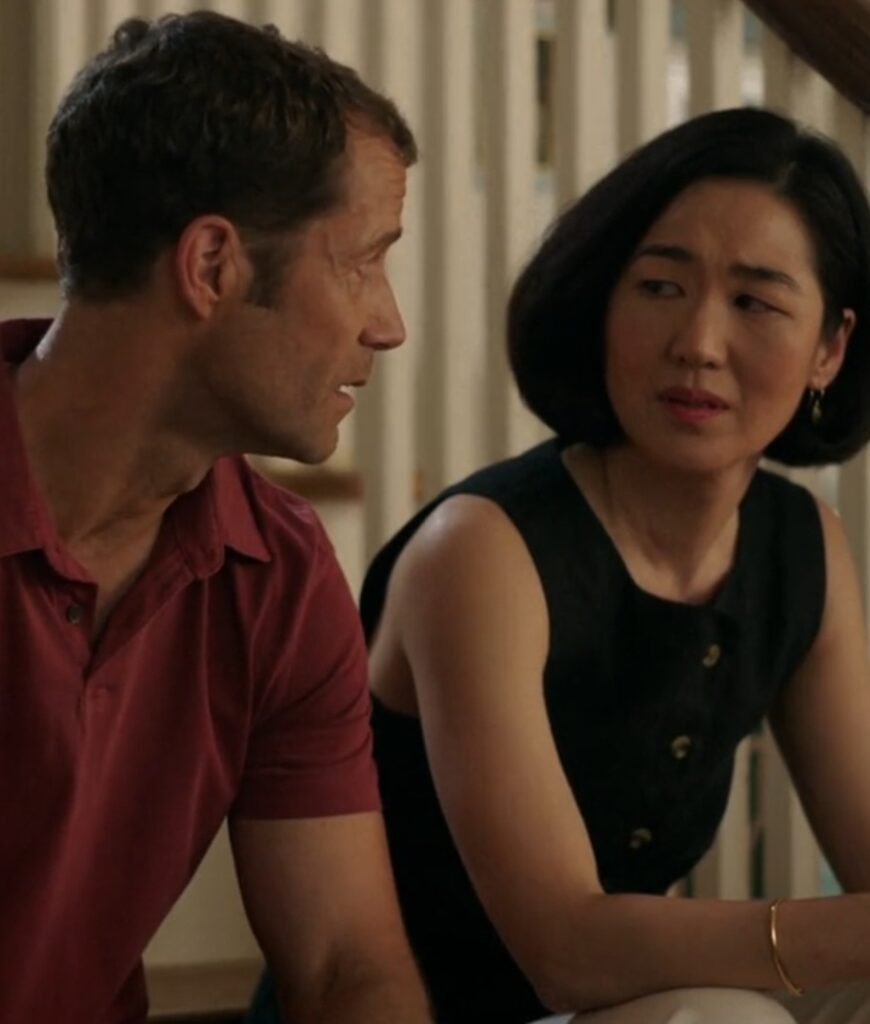To say that it has been an interesting season of The Summer I Turned Pretty would be an understatement.
But it has inspired some observations about the show that may depart from the norm, and with each installment, more aspects of the show come to light.
The Summer I Turned Pretty Season 3 Episode 4 was an hour that quietly reinforced and raised some points about gender, and in this particular case, I couldn’t help but think about the series’ approach to masculinity.
The trappings of masculinity are pervasive throughout this series, and we see it reflected in all of the male characters, but it’s not just about how they behave, but the general reaction to them.
Adam’s emotional abuse has been pervasive throughout the series. Still, it feels particularly glaring during this final one. So much of that lies in his own narcissism and what one can only presume is a pattern of generational trauma he was unwilling or unaware enough to try breaking.
But he’s also so representative of this concept of masculinity that society loves to uphold. Now? We call it precisely what it is — toxic.
However, that hasn’t changed the fact that there’s this idealism overshadowing the toxicity, and sometimes I’m unsure what The Summer I Turned Pretty is angling for when it comes to its male characters.
Does it celebrate toxic masculinity, or is it just reflecting on us the fact that society does? I know, it seems “too deep,” and it may seem like I overanalyze or read into things too much, but honestly, I do, and I can’t help it.

What I’ve found striking is how the series continuously regards John Conklin.
He becomes a perfect foil to characters like Adam or even Laurel, but what amounts to a genuinely decent, emotionally open guy with decent communication skills results in him often on the fringes of the series, and the series treating his “softness” like some form of weakness.
On a series where the bulk of the characters struggle with adequate communication and processing their emotions in healthy ways, it’s fascinating to see how John’s emotional sensitivity, which could ground situations more, is dismissed as often as it is.
By sidelining a character like John so often and keeping him on the outskirts during critical moments and plot points, it does reinforce this idea that his emotional maturity, senstiviey, and intelligence is somehow of lesser value than Adam’s toxic embodiment of masculinity, and how the remaining male characters perform for, seek approval from, and generally suffer under it.
It’s not John, someone who had just as much, if not more, stake and involvement in the Conklin-Fisher’s lives, that the boys look to, try to emulate, or even hold in high regard, regardless of treatment; it’s Adam.

And the narrative continuously reinforces this throughout the series, particularly among John, Laurel, and the kids.
On paper, it actually makes sense why Laurel and John would’ve been a couple. The series never delves into the cultural components that contribute to Laurel’s stoicism and repression — a missed opportunity in the narrative — but this is precisely why a woman like Laurel would be drawn to someone like John.
Surely, their dynamic in the early stages of their relationship was fascinating because of the balance.
As someone whose default of repression can align with the likes of Laurel and Conrad, I know the appeal of the emotionally available and vulnerable. How can you not admire people so in tune with their emotions and so free with expressing them?
But that admiration should also come with appreciation and validation, and no one in this narrative actually does that with a male like John, who expresses himself so freely. The advantages of what he has to offer are often what others dismiss rather than champion.

Laurel is such an independent person, and we now have more insight into why she felt she lost her identity in her marriage. But with her inability to adequately express herself, she left John feeling like he was a mistake and a problem in their relationship.
And Laurel only reaffirms his fears when she constantly excludes him from information pertaining to their children, big issues, conflicts, and so forth.
Laurel unwittingly invalidates and emasculates John at every turn, but why? Because unfortunately, his softness, emotional sensitivity, and seemingly passive quality are equated with feminine qualities and thus disrupt the antiquated view society has of masculinity.
It’s frustrating that this trickles down to the kids as well.
Ironically, Belly rarely wants to confide in her father when she’s going through difficult times. She craves the attention and support of Laurel — in part, because she subconsciously associates mothers with exuding feminine qualities that are lumped in with being maternal.

And Steven’s dismissal of his father is particularly galling and unfortunate. John’s career as a tenured professor at an esteemed college in a subject matter that one doesn’t associate with competitiveness, (toxic) masculinity, and success.
He acted as if John couldn’t possibly understand the hardships of a demanding job or that his career wasn’t as valuable or noteworthy as that of a corporate finance professional like Adam.
Steven acted as if his father had no value or insight to provide, as if he was somehow less of a man — and more frustratingly, less of the man Steven aspired to be, despite John objectively being exactly the healthy type of guy for whom the others should aspire.
Conrad chronically suffers under the weight of his father’s hard demands, and much of that is rooted in this narrow concept of what it means to be a man.

Adam focuses solely on performance, action, and image, neglecting emotions and feelings. This omission highlights the Fisher boys’ lack of a positive example for regulating emotions.
The narrative recognizes how this damages Conrad while still simultaneously romanticizing the specific quality of repressing emotions that Conrad exudes.
He’s the strong but silent type who suffers silently, but it’s almost framed as noble in some regard. And the only emotions that are regarded as something that “needs improvement” relate specifically to his ability to express his love for Belly and nothing else.
By tying his emotional arc and journey specifically to an outcome of winning, Belly, as a result, it does nothing to destigmatize how he suffers under the weight of upholding a toxic idea of masculinity instilled by his father in other aspects of his life.
It shouldn’t have to be this way for this kid at all. Instead, suffering and silence are equated with strength. For as much as we see it and want Conrad to grow from that and be healthy, there’s still this undercurrent of the “tragic hero” that romanticizes his struggle.

Because his learning to improve is essentially for Belly and not because it benefits him on all levels to dismantle the toxicity that has caused him so much pain, anxiety, and his ability to function healthily and maintain bonds in general, not just romantically.
And this all reflects in Jeremiah as well. Adam can indulge the aspects of Jeremiah that he feels are distinctly masculine — athletic prowess and a specific ideal of casually pursuing women, specifically, without attachments or strings.
But it’s not lost that he doesn’t abide by the aspects of Jeremiah he associates with femininity — his softness, sensitivity, emotional vulnerability and openness, and, yeah, his queerness.
There are layers to Adam’s specific hangup with Jeremiah in the context of how it also ties into this young queer man. Not only is his emotional sensitivity and openness deemed inadequate and “less manly,” but his physically affectionate nature and willingness to seek it out are shrouded in this negative stigma of “neediness” and femininity.
And sadly, many of the other characters and even some viewers respond similarly.

Jeremiah is a flawed character like most, and, like his brother, he has struggled with how to regulate his emotions healthily because of their toxic upbringing.
With work and growth, he’s a guy who could have a similar degree of emotional intelligence and balance as someone like Adam. He has the bones for that when he eventually sheds himself from the confinements of trying to make his father proud and seeking validation from others.
But when parsing through his flaws, there’s this innate fixation on deriding him for his emotional vulnerability, especially when comparing him to his brother.
With every berating comment Adam directs toward him, there’s this notion that he’s not only immature or irresponsible, but that his bout of expressing emotions is akin to “hysterics” and childishness.
As if to say that “real men” aren’t so sensitive, soft, or gentle.

Jeremiah’s emotional honesty, something that the narrative celebrates and lauds in Susannah, is rebuffed, trivialized, or demeaned in him.
Why? Because the reality is that we as a society are conditioned to see those traits as distinctly and uniquely feminine — not only that, but the mark of a well-rounded female character.
In comparison, Laurel’s emotional distance, stoicism, and repression are portrayed as problems that render her a flawed mother and romantic partner.
It’s where she falls short and where many of her insecurities lie.
The series frames Jeremiah’s softness in a way that makes him seem decent for “puppy love,” but not a strong enough suitor for the distance due to the idea of what it means to be a worthwhile, strong romantic male lead.

Because somewhere along the way, a grasp of emotional intimacy comes with a caveat — some rigid lens that makes it a goal but also something worth devaluing, especially in relation to masculinity.
We see that with Jeremiah, but more explicitly, directly, and less controversially, we see that with John Conklin.
Nevertheless, this season has been interesting in showcasing how a character like Adam Fisher sets the precedent for so many issues — but also what it’s like for a series navigating what masculinity looks like onscreen and how we react to it.
The devaluation of soft masculinity, policing of vulnerability, romanticizing of repression, and glorifying of toxicity — it all makes for a fascinating examination of gender onscreen.
Watch TSITP Online
You made it to the end — and that means a lot. I hope you enjoyed this piece and look forward to your insight.
We’re an independent site run by passionate fans, not studios or corporations. If you enjoyed this piece, please share it or leave a comment — it really does help.
The Summer I Turned Confused: Why Is TSITP Struggling to Make a Case for Either Romantic Endgame?
Is The Summer I Turned Pretty’s final season actually trying to set up a romantic endgame? Because it doesn’t feel like it.
The Summer I Turned Pretty Exposes How Emotional Abuse Thrives in Silence
Beyond the love triangle, The Summer I Turned Pretty delivers an uncomfortably realistic look at emotional abuse and how it thrives in silence.
The Summer I Turned Pretty Season 3 Proves Belly Should Choose Herself
If The Summer I Turned Pretty Season 3 hasn’t proven anything, it’s that Belly Conklin should be her own endgame.
The Summer I Turned Frustrated: It’s Not Jeremiah, It’s the Writing
Is The Summer I Turned Pretty relying on contrived plots to push a romantic endgame it isn’t earning? Here’s why it feels that way.
The Summer I Turned Pretty Season 3 Proves the Best Ship Is Everyone + Therapy
The Summer I Turned Pretty premieres with a time jump, drama, and a harsh truth: the triangle needs a therapist more than a conclusion.
TV Fanatic is searching for passionate contributors to share their voices across various article types. Think you have what it takes to be a TV Fanatic? Click here for more information and next steps.
The post Soft Boys, Sad Boys & Bad Boys: What The Summer I Turned Pretty Reveals About the Perception of Masculinity appeared first on TV Fanatic.






